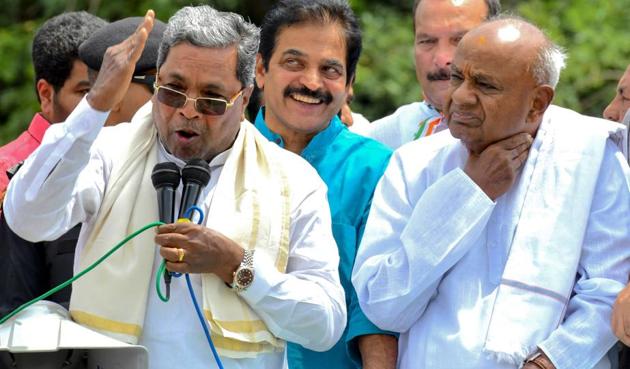Opinion | In Karnataka, it is now advantage BJP
The battle between the Congress and the JD (S) has meant that the BJP is on the cusp of coming to power
It was in May 2018 that the people of Karnataka voted for a new assembly. But if the current political crisis in the important southern state continues unabated, Karnataka could well be voting for a new government.

Here’s why: On July 6, 10 MLAs of the Congress and three of the Janata Dal (Secular) ---- the two parties run a coalition government in the state ---- submitted their resignations to the Speaker, Ramesh Kumar, who was on leave. The rebel MLAs also met Governor Vajubhai Vala and then flew to Mumbai and have been holed up in a hotel ever since. On July 8, independent MLAs Nagesh and R Shankar followed suit, taking the number to 15. The resignations were meant to coincide with the return of Chief Minister HD Kumaraswamy from the United States, who has blamed the Bharatiya Janata Party (BJP) for engineering the dissent drama. Meanwhile, other ministers of the Cabinet resigned, saying that they want to give a free hand to the chief minister to accommodate the rebels in plum ministries. Two more Congress MLAs quit on Wednesday amidst high drama at the Vidhana Soudha. The Congress’s crisis manager, DK Shivakumar, who left for Mumbai on Wednesday morning to placate the rebels, was refused entry into the hotel all day, detained by the Mumbai police and later in the evening sent back to Bangalore.
The Karnataka assembly has 224 seats, of which the BJP has 105 and the coalition had 119 until this drama ensued. If the resignations are accepted by the Speaker (he has ruled that some of them cannot be accepted as they are not in the prescribed format and so have to be resubmitted), and more resignations happen, the coalition will be reduced to a minority. The rebel MLAs have moved the Supreme Court against the rejection of their resignation; the apex court is expected to hear the case on Thursday. It is most likely that when the Karnataka Assembly reopens on July 12, the BJP that has numbers on its side will move a no-confidence motion against the Congress-JDS government; and if the resignations are not accepted by even that time, the rebels can abstain from voting, an outcome that would still be advantage BJP. This is what the saffron party would also prefer, instead of going for an election.
The key question is what lies at the root of such a drama in the state?
On the surface, there are many reasons: veteran Congressman and former state home minister Ramalinga Reddy is upset over being sidelined by Kumaraswamy, state Congress president G Parameshwara and young leaders such as Dinesh Gundu Rao and Krishna Byre Gowda. Then there are loyalists of former chief minister Siddaramaiah, such as actor BC Patil and Bangalore MLA and controversial real estate baron Muniratna Naidu, who feel that they were sidelined by the CM. On the JD (S) side, party president AH Vishwanath resigned for more or less the same reason.
But the root of the rebellion is the old mega feud between two political titans: Congress’s Siddaramaiah and JD(S)’s Deve Gowda. The latter won the last round in May 2018 with the ouster of Siddaramaiah and installing his son, Kumaraswamy, in the CM’s seat. But a year later, Deve Gowda faced a humiliating defeat in the general elections. He felt that his grandson Nikhil Kumaraswamy’s defeat in the party bastion, Mandya, was engineered by the Siddaramaiah camp.
Now the resignation of Siddaramaiah’s loyalists indicates that this round has gone to their leader. According to reports, Siddaramaiah had complained to Rahul Gandhi about growing discontent in the coalition ranks. Deve Gowda, in turn, also complained to Gandhi that all this was Siddaramaiah’s manipulation.
There is a saying in Kannada ‘Ibbara jhagala, moornevana laabha’ (When two men fight, the third man gains.) This is exactly what has happened in the state. The BJP has been nursing its grouse after the closely-fought assembly election and has now found the perfect time to strike.
If there is indeed a change in government, the BJP will add another feather to its cap after winning 25 out of 28 Lok Sabha seats. While B S Yeddyurappa, a Lingayat strongman and former CM, who ensured the saffron party’s victory for the first time in 2008, does not command the same authority anymore, there seems no alternative as of now. But as neighbouring states Tamil Nadu and Kerala get ready for assembly polls next year, coming to power is what matters most to the BJP in its gateway to the South, not the man on the throne.






